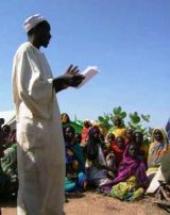No breakthrough in first day of Sudan’s Darfur peace talks
ABUJA, Nigeria, Oct 25, 2004 (AP) — Sudan ‘s government and rebels wrapped up a first day of new Darfur peace talks Monday, trying to break a deadlock over key security issues keeping aid workers from reaching hundreds of thousands of refugees in the western region of Sudan .

|
|
Refugee children listen to their teacher in the new Red Cross camp for Darfur refugees at Tréguine in eastern Chad, where they receive instruction in hygiene, in this file photo taken in October 2004. Despite having fled their homeland, these children are still following the Sudanese school curriculum, ensuring that that when they return, they have missed no schooling. |
The rebels said they will press for a security agreement before signing a humanitarian accord. That demand led to the failure of talks in Nigeria a month ago, and many are skeptical the new talks will fare any better.
“Although I should have reasons for being optimistic, I am not,” said Abulrahman Zuma, a press adviser to the Sudanese government and a delegate at the African Union-brokered meeting in the capital, Abuja.
Monday’s talks ended earlier than expected after rebels objected to an African Union plan calling on them to meet directly with government officials to iron out a specific agenda for talks on security in Darfur.
The rebels want the African Union, which is chairing the talks, to meet with each side separately to determine the agenda before starting face-to-face talks with the government.
“There isn’t any trust between us and the government,” said the leader of the rebel Sudan Liberation Army, Abdelwahid Muhamed El Nur.
The crisis in Sudan ‘s western region began in February 2003 when rebels rose up against the Arab-dominated government, claiming discrimination in the distribution of scarce resources in the large, arid region. Major bloodshed ensued when pro-government militias called Janjaweed reacted by unleashing attacks on Darfur villages.
The United Nations has called Darfur the world’s worst humanitarian crisis and said it has claimed 70,000 lives since March, while 1.5 million have fled their homes since fighting began in February 2003.
A key sticking point in reaching deal on security is a government demand the insurgents disarm.
But the rebels – the Sudan Liberation Army and the smaller Justice and Equality Movement – insist the Janjaweed must first be reined in and disarmed.
The Sudanese government has promised to allow humanitarian agencies unfettered access to areas of Darfur under its control, as stated in a draft humanitarian aid accord which guarantees similar access for aid workers in rebel-controlled areas.
The rebels say existing accords already provide for relief efforts and Janjaweed attacks make it impossible to do more to protect aid workers.
Despite disagreements, El Nur said his group would remain at the talks because they were “here to solve the problem comprehensively.”
But he warned: “My belief is that if the security issue is not solved, then we will not solve” the Darfur crisis, he said.
Zuma, the government official, said: “The problem is the other side – they are not united under responsible leadership.”
On Sunday, European Union foreign policy chief Javier Solana, who met Sudan ‘s foreign minister in Khartoum, urged the government to unilaterally sign the humanitarian protocol as a confidence-building gesture. Sudan ‘s Foreign Minister Mustafa Osman Ismail said the EU request would be considered and promised to cooperate with the international community.
The U.N. Security Council has said it would consider penalties such as sanctions if the Sudanese government fails to disarm all militia and restore peace.
Jan Pronk, the top U.N. envoy for Sudan , said the U.N. Security Council would meet in Nairobi, Kenya, from Nov. 18-20 to discuss the crisis.
Meanwhile, Pronk said a splinter Sudanese rebel group called the National Movement for Reformation and Development, based near the northwestern Darfur city of Tina, had launched a series of attacks this month against police, other rebel and tribal factions and Sudanese troops.
Hassan Khames Grow, one of the rebel group’s leaders, said it had split from the Justice and Equality Movement six months ago because the larger group has “an Islamic agenda.”
Speaking by phone from Darfur, Grow said his movement had 3,000-4,000 armed fighters and warned they would attack African Union peacekeepers and government troops because the African Union had ignored its demand to attend peace talks.
Last week, the AU agreed to increase its peacekeeping force in Darfur from 390 to 3,320. The larger force is expected to be fully deployed early next month.
